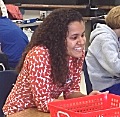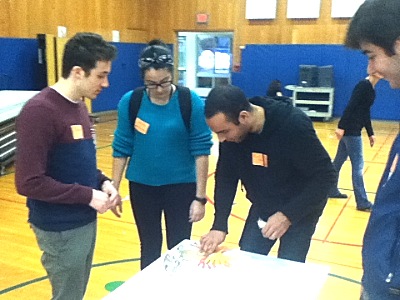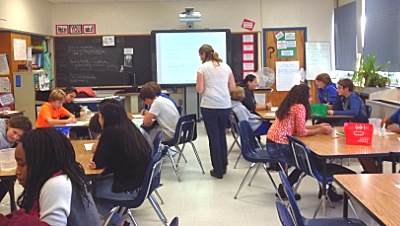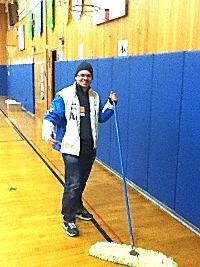- By Dan Veaner
- Around Town
 Print
Print  100,000 Brazilian Science, Technology, Engineering, Mathematics (STEM) students are being sent to United States colleges and universities to promote scientific research, invest in educational resources, increase international cooperation in technology and science, and to engage students in a global dialog. A dozen of them are at TC3 this semester, preparing their English and cultural skills before going to four year institutions to study their fields. They were at Lansing Elementary School Friday to help with the annual Thanksgiving luncheon.
100,000 Brazilian Science, Technology, Engineering, Mathematics (STEM) students are being sent to United States colleges and universities to promote scientific research, invest in educational resources, increase international cooperation in technology and science, and to engage students in a global dialog. A dozen of them are at TC3 this semester, preparing their English and cultural skills before going to four year institutions to study their fields. They were at Lansing Elementary School Friday to help with the annual Thanksgiving luncheon.In fact, they have spent a lot of time in Lansing. Earlier in the semester they were treated to a tour of Borg Warner. Yesterday Lansing couple Dan and Eve Brown hosted a Thanksgiving dinner for the students, and they have tutored Lansing Middle School students. The field trips are part of an intensive class in American culture taught by adjunct instructors Christine Iacobucci and Patrick Sewell. Iocabucci is also a long-time member of the Lansing Board Of Education.
 Brazilian students from TC3 preparing Friday for the Lansing Elementary School Thanksgiving Dinner
Brazilian students from TC3 preparing Friday for the Lansing Elementary School Thanksgiving Dinner"Christine's connection with Lansing Elementary School has been great," says TC3 program coordinator Melinda Slawson. "Those people who are interested in education have had a chance to tour the school and tutor students in the past month or so. They are really good at math and science so they enjoy seeing an American public school and talking to students and helping them. That's what we want. We want them interacting and looking at various aspects of life here and having real communication."
The program is sponsored by the Brazil Scientific Mobility Program, which provides scholarships to STEM students who have been nominated by their universities. So far the program has sent over 400 Brazilian students to more than 300 colleges in the United States. Over 1,000 of them also participated in internships at U.S. corporations and organizations while here. They spend 12 months in the U.S. studying in their fields, and another six months in preparatory programs like the one at TC3.
"We tried to create a course that would give them some cultural background so when they go on to take their courses and their internships they will have a better sense of our culture and language," Slawson says.
Bringing their English language skills up to snuff and making them confortable in the classroom and the community is where TC3 comes in. Students are enrolled in an intensive program of 12 to 18 credit hours to become proficient in English and immerse them in American culture. Classes include eight credit hours of English as a Second Language, and four hours of an academic speaking class, the practicum that Sewell and Iacobucci are teaching, and one introductory level class in one of the STEM fields that is closely related to their own field of study. But it's not just about classroom learning. The field trips provide opportunities to interact with Americans and learn what life here is really like. The Borg Warner visit was a special treat.
"That was interesting to them because so many of them are engineers," Slawson says. "They saw that there is an international corporation that has a facility here. That was exciting for them. They went to the apple festival and did some volunteer work there. They went to Porch Fest and the Peachtown Festival in Aurora. So we're trying to show them different aspects of life here."
 Brazilian engineering, geologists, and statistics students tutoring at Lansing Middle School
Brazilian engineering, geologists, and statistics students tutoring at Lansing Middle SchoolSlawson says the program is designed not only to improve students' English, but also to provide a more realistic understanding of what it is like to live in America than popular entertainment provides.
"U.S. culture is so embedded in their own culture that they come feeling that they already know our culture," Slawson days. "Some of them have had access to English from various sources, whether it's TV and movies or really good instruction. Watching TV and movies is kind of good (for learning language), but it gives them a false sense that they understand the culture. In some ways they have a shallow understanding that they think is the whole picture, so we spend weeks and months learning that there are some not-so-glossy things happening here. That's part of Pat and Christine's job, to talk to them about those things. They have a lot of interesting discussions in that class."
Community service is part of the program to immerse the students in situations where they can have authentic communication opportunities with Americans. Friday's Thanksgiving dinner was a perfect venue where they helped serve meals, watched the program, and ate with students, parents and staff.
Hosting the program is also a boon for American students, who have a unique chance to room with visiting students and learn about their culture as well.
 Cleaning up the Lansing Elementary School gym after the Thanksgiving Dinner"Their impression of American college students and their experience living with them is interesting," Slawson says. "For the most part we chose to house them together, and some of them have Americans for roommates. That makes us aware of where we need to go with helping our American students work with different kinds of people. We're not that good at being and functioning with people that are not like us. We can do better."
Cleaning up the Lansing Elementary School gym after the Thanksgiving Dinner"Their impression of American college students and their experience living with them is interesting," Slawson says. "For the most part we chose to house them together, and some of them have Americans for roommates. That makes us aware of where we need to go with helping our American students work with different kinds of people. We're not that good at being and functioning with people that are not like us. We can do better."After they leave TC3 they will attend schools such as study at colleges across the U.S., such as Rice University, New York Institute of Technology, St. Johns University and Rose-Hulman Institute of Technology for more intensive study in their fields. The Brazil Scientific Mobility program is adding graduate students to the mix, planning to place them in U.S. universities starting in the fall of 2014.
Slawson says that she would love to repeat the program for a new wave of students, but scheduling is a challenge because the Brazilian school year does not align with that of the U.S.. TC3 has to pass on the next wave coming in March, but Slawson says she hopes to be able to work with another group scheduled to arrive in July.
"It's good for them to be in a smaller place like TC3 for this initial experience because we can give them a lot of individual attention," she says. "They're having their first semester in the United States and experiencing culture shock and everything that goes along with that. We have created a program just with them in mind. At TC3 we have a lot of diversity, so that's interesting for them because it's a bit of a microcosm. They're living in residence halls, so they're seeing a whole gamut of the American experience."
Photographs courtesy of Patrick Sewell and Christine Iacobucci



